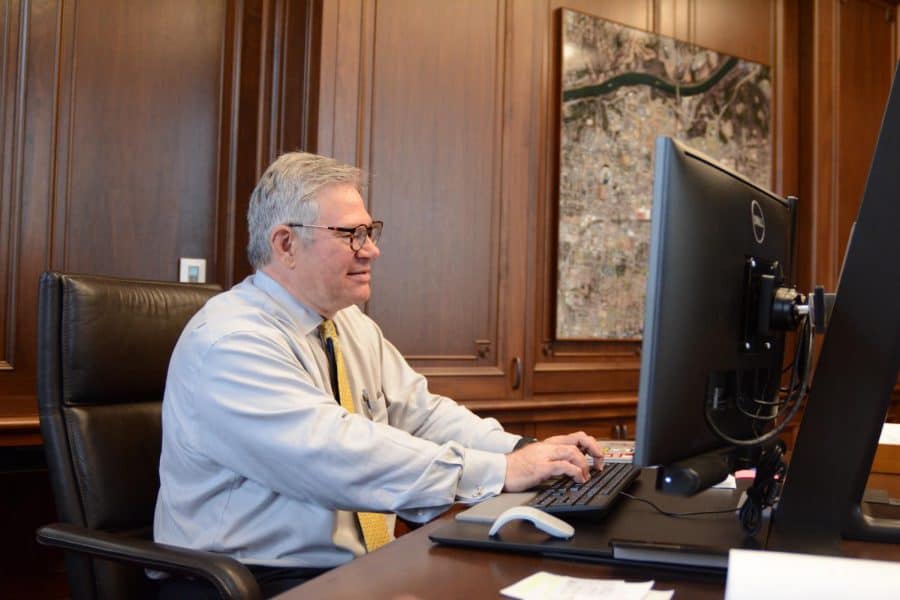Finance and operations VP addresses concerns among employees
Rumors of Matt Fajack (pictured) outsourcing the Supe Store and Ferguson Mail Center, along with suspicions of staff’s spring break being taken away, have concerned staff. CW/ Keely Brewer
April 4, 2019
Matt Fajack joined the University as the vice president for the Division of Finance and Operations in February 2018, following his positions in financial affairs at both the University of Florida and the University of North Carolina at Chapel Hill.
Since his arrival more than a year ago, most notably in recent months, concern has circulated among employees of the Supe Store and the Ferguson Mail Center who have questioned their job security following rumors of Fajack’s plans.
Proposals for outsourcing both the Supe Store and Mail Center, along with suspicions of staff’s spring break being taken away, have caused concern for staff. It has left them wondering which rumors were rooted in fact and which were nothing more than a miscommunication spread throughout the workplace.
One Supe Store employee voiced the fear she has felt in past months about the security of her job.
“There are people’s livelihoods,” she said. “When you’re employed by the University, your child can go here for half off. There are people who have children here. There’s another lady who’s two years away from retirement. She has to have answers to that.”
This fear stems from the anticipation of Fajack outsourcing the Supe Store, despite his rejection of the validity of these claims. Her fears were not isolated, but reportedly felt among many of her peers.
The combined loss of retirement and benefits, along with the lower employment that would accompany these potential changes were cause for trepidation. These workers wondered if Fajack’s reassurance over the course of several staff meetings was simply a facade.
Fajack denied these allegations and points to his previous position at the UNC-Chapel Hill as the driving force behind these rumors. Upon his arrival at UNC, he said its campus bookstore was in a state of disarray, in need of renovations and facing poor margins. He provided its management with an opportunity to make adjustments to no avail, leading to his decision to outsource the store to Barnes & Noble.
Comparing his decision to outsource at UNC to the possibility of outsourcing at The University of Alabama, he said, is like comparing apples to oranges. North Carolina law requires that all profits from bookstores or student stores be channeled directly to scholarships.
Prior to outsourcing, Fajack said UNC was profiting approximately $400,000 annually. Barnes & Noble was able to guarantee a minimum of $2 million every year to scholarships for students at the University. Additionally, Barnes & Noble provided $3 million for renovations of the UNC bookstore. His reasons for outsourcing at that location do not translate to the Supe Store.
Before agreeing to outsource at UNC in the face of protests on campus, Fajack ensured that staff members would receive the same benefits they had prior to the change. When it was realized that their benefits would be reduced, UNC compensated by raising their wages.
“Our Supe Store is very well run,” Fajack said. “Our margins are right there with the rest of the industry. The sales per employee and our profit margins are as good as the industry and, in some cases, better. The store looks great, so I have no intention of outsourcing.”
The Supe Store staff member who spoke with The Crimson White also provided insight into concerns among workers at the mail center, another campus store where outsourcing was supposedly a possibility. This person said Fajack’s plans had been proposed but rejected. The purported reasoning for selling off-campus mail was the number of complaints from customers that employees were failing to witness.
“I know there were rumors going around,” one mail center employee said. “But [Fajack] held a meeting and told us it was off the board.”
Fajack suggested these rumors likely spiraled from an initial consideration to outsource that was replaced by a proposal on March 15, but the Supe Store employee claimed she was unaware of the status of this decision until March 20. This proposal detailed plans to place package bins at a number of locations around campus to expedite mail pick-up for students. Installation of these bins along with improved software to make shipping and delivering mail a more efficient process are scheduled to go in effect prior to the fall 2019 semester.
The security of employees is at the root of these concerns, and Fajack is sure these proposed changes will pose no threats to current workers. One member of the mail center staff plans to retire at the conclusion of the academic year, while two more are on track to graduate. Fajack said it’s possible these positions won’t be filled, but no other employees will be laid off.
Over the course of months filled with worry, an apparent lack of communication between Fajack’s administration and employees left room for rumors to spiral out of control. The Supe Store employee expressed frustration about Fajack’s lack of willingness to call a meeting when these fears initially surfaced.
The Supe Store staff member posed additional questions concerning the legality of the lack of representation from Human Resources at the staff meeting Fajack held to address circulating rumors. Without HR representatives, the concerns of those who would be most immediately impacted by Fajack’s decisions felt their concerns were being brushed aside.
“You can’t tell people they may be out of a job in three months and not have HR there,” said the Supe Store employee.
HR is housed within the Division of Finance and Operations, and Fajack serves as the head of this office. He said some questions about benefits could have been more fully answered if a specific representative from HR had been present, but he was not anticipating these types of questions from employees at the time.
Perhaps the most widely circulated rumor among the staff of campus stores was the potential loss of spring break. At the University of Florida, Fajack shortened the Christmas holiday for employees one year. This decision followed nearly $80 million in budget cuts from the state in the midst of the Great Recession.
Fajack proposed an explanation for this misinformation spiraling out of control.
“Some people saw the word ‘tentative’ and thought that maybe we’re not going to close at all next Spring,” Fajack said
A schedule for the following academic year with tentative dates for the week of spring break was announced. Official dates could not be released before communicating with the city and county schools in order to align their breaks and close for the same period of time.










